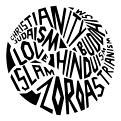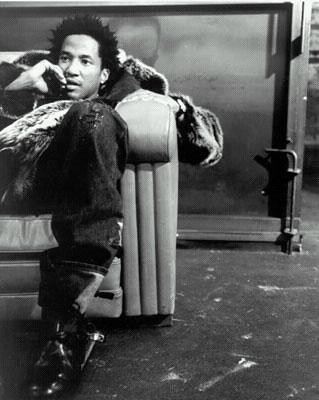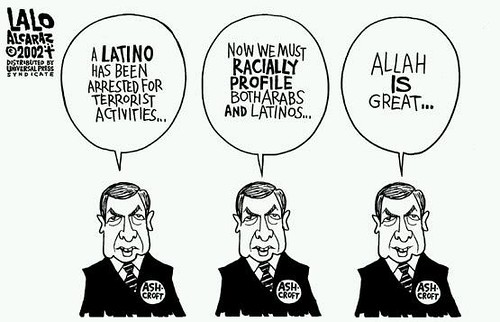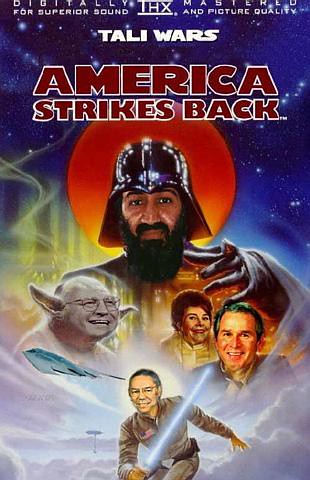Islam is at the heart of an emerging global anti-hegemonic culture that combines diasporic and local cultural elements, and blends Arab, Islamic, black and Hispanic factors to generate "a revolutionary black, Asian and Hispanic globalization, with its own dynamic counter-modernity constructed in order to fight global imperialism. (say what!)
Friday, April 29, 2005
the tao passes the turing test
There are many people out there who consider themselves to be atheists and they would claim to disbelieve in the existence of"God". But do you ever come across people who call themselves A-Tao-ists? I doubt it. It doesn't really make sense to ask whether the Tao exists or doesn't exists. There is some reason for why there is Something instead of Nothing. There is some reason for why there is Order instead of Chaos. It exists. Whether you call it Tao, Allah, the Absolute, the Ultimate Reality, Jah, or Fred. It's there. The real question is: what is it like?
And given the fact that most earthlings believe in some form of personal deity, it seems fairly clear that this reality, this entity, passes the Turing test. (The concept of the Turing test comes out of computer science, where researchers struggled to define what does it mean to say that a machine is "intelligent". And to put it very, very, simply, the suggestion is that something is *defined* to be intelligent if when you talk to it, you feel that an intelligent being is "talking back".)
So based on the evidence of human religious experience, it is pretty clear that most people do have this sense. We don't have to delve into God's "neurology" and insist that he has a physical human brain with lobes and hemispheres, or that his "anger" is like our "anger" or that his "mercy" is like our "mercy". Far from it. The Quran, at least, is clear that the Creator is unlike the creation. Allah is so amazingly Amazing that he beggars human language. Our words can't touch him.
But nevertheless, that doesn't preclude us understanding our own dependence on a Higher Power and expressing that awareness in the form of love, devotion and awe. Personal language is meaningful, not because God needs our words or feelings, but because we need express them, for our own sakes.
The farmer needs to understand his survial depends on the soil and the rain. The sailor needs to know his life is in the hands of the sea and the wind. And we need to cultivate a similar kind of gratitude and respect for God. Not in order to curry favor by stroking the divine ego, but because we need to keep our own in check. In earlier times, this knowledge might have been maintained by sacrifices to nature spirits or other creatures, and modern-man might view such practices as superstition, but from another point of view they are grounded in an uncompromsing absolute realism.
the hitchhiker's guide to the galaxy

Hitchhiker's Guide to the Galaxy is coming out in movie theatre's today. Hopefully I'll be able to find a group of friends to go see it soon. Mos Def is in the movie playing Ford Prefect.
(I'm making sure to mention him because he's my thin and tenuous "justification" for mentioning the movie here at Planet Grenada. I'm actually planning on writng a seperate blog entry sharing some thoughts and info on Mos Def too. I love Mos Def. I've often thought to myself that the ummah could really use an "intellectual (i.e. academic, scholarly) Mos Def". But the more I read about him, the more I realize that reflects my own pre-conceived notions. He's not exactly a slouch. His creative career has been rapidly expanding in a couple of different directions, making (remarkably thoughtful) hip-hop music, Def Poetry, acting and activism. He's already making serious contributions to culture, even if its not in the ivory tower
Anyway, Hitchhiker's Guide has already been made into a television series (like over 20 years ago!) and a radio show. Even a computer adventure game (Oh my God, I feel so old. I used to play a bunch of those Infocom text adventures on my Commodore 64 way back in the day. Sometime in the future, a kid in middle school is going to be taking a history test where they have to identify which artifact is older...and on one side of the page they will be shown a commodore 64 and on the other they will be shown a picture of some kid in breeches playing with a hoop and a stick in the street... and this will be the hardest question on the test.)


So for all you archeologists out there, here is a site where you can actually play alot of the classic Infocom games. Some of the games might require maps or other props which were sold with the original packaging but you should at least be able to get a flavor of how the games worked back in the day. Besides, I'm almost certain that if you do a search online you should be able to find the relevant information online in some form which will let you complete the games.
But as far as the new movie goes, I should probably wait till actually seeing it before commenting much on its islamic or afro-futuristic implications. (athough the original novels did get into a fair amount of theology in a very quirky and lighthearted way. InshaAllah we'll see how, or whether, the subject is handled by the film.)
Thursday, April 28, 2005
perennialism and traditionalism

Perennialism is the name of an school of thought which has become popular among some Muslims, especially in the West, this past century. Some of the prominent figures in this school are Rene Guenon, Titus Burckhardt, Martin Lings, Charles le Gai Eaton, Seyyed Hossein Nasr and Frithjof Schuon. (There are other people involved in the larger movement which includes Hindus, Christians, and even some straight-up Fascists, but the above names are the most prominent among those who claimed to be Muslim.)
The basic idea is that there is a single body of truth known as the perennial wisdom which human beings have known from a very early point in history and which gets restated over and over again in the world's major religious traditions. So, for example, Muhammad (saaws), Jesus (as), Krishna, Zoroaster etc. were all basically teaching the same eternal principles, except in a language appropriate to the needs of their audience.
(In some sense this is similar to the Bahai faith which also affirms a belief in the Buddha, Muhammad, Jesus, Zoroaster, Krishna, and others. Although one difference is that the Bahai faith has a notion of "progressive revelation" which develops a time-based hierarchy among the religions. And since the Bahai faith is the most recent, it sits at the top of the hierarchy before those which came before)
You might think this suggests some kind of cafeteria-style spiritual free-for-all but the above names were also part of a movement known as Traditionalism which asserted that this perennial wisdom is best expressed in the traditional, authentically-transmitted, orthodox versions of the various religions. So even if at a very deep level, the various religions agree, it still isn't appropriate to mix and match. Each path should be taken seriously, and followed on its own terms.
So the Perennialists are interesting because, on the one hand, they seem to see a great deal of value in other religions and other civilizations. But on the other hand, they also strive, in their own way, to stay faithful to a particular religious tradition and stay "orthodox".
Some members of the movement, especially in its "Traditionalist" form really emphasize the past and see the modern-age as decadent with things only getting worse. (I have the impression that this is what really motivates the scarier Fascist-Traditionalists)
Mark Sedgewick has a website which goes into a certain amount of depth on Traditionalism and its different manifestations (Actually that first page is an interesting article on the introduction of sufism to the west, but if you go to the homepage you'll find more ino). Sedgwick also has a paper called "Marginal Muslims in Cyberspace"
You can also go to Religio Perennis which is another website which deals with these ideas, but more from an insider's perspective.
And as a counter-balance to give another side of the issue, Dr. Muhammad Legenhausen wrote a piece called "Why I am not a Traditionalist" for a pretty thorough discussion of Traditionalism faults from the point of view of a Muslim who rejects it (rather thoughtfully I should add)
Also at the Living Islam site you can find a page which doesn't deal with these terms head-on but discusses issues in the same ballpark from a critical Islamic perspective.
metaphysics of interfaith dialogue
Wednesday, April 27, 2005
bahais and divorce

The following piece is from Juan Cole, who was formerly a member of the Bahai faith but left because of differences of opinion with the Bahai administration.
An internal Baha'i household survey done in 1987 found that the divorce rate in the U.S. Baha'i community was higher than that in American society as a whole. The report was never released to the public.
My own suspicion is that the high divorce rate has several causes. First of all, Baha'is are encouraged to utopian ways of thinking. Two young people with little in common save that they are recent converts to the faith will be encouraged to marry. I have seen this sort of thing over and over again with my own eyes. This utopianism is widespread in the faith and is the same reason for which so many other Baha'i enterprises end up doing damage to people. That both are "Baha'is" is not a basis for a marriage. One may be a liberal and the other a fundamentalist; current norms against such labeling make it difficult for people to identify one another on that basis, but you'd better believe the difference would show up in a marriage!
Young married Baha'is are also encouraged to pioneer, whether abroad to places like Haiti and Nicaragua, or homefront. Being uprooted from their social networks and families and isolated in a strange environment is not good for them as young marrieds.
In smaller communities the Baha'i committee work is a killer, and may isolate the two spouses, who spend less time together just coccooning and watching t.v.
And it is my estimate that from a third to a half of U.S. Baha'is are what the sociologists would call marginal people--persons with poor social skills who are emotionally needy and who join the faith because they are love-bombed and find a high proportion of other marginals in it. A high rate of marginality is fostered by the cultists who have infiltrated the administration, since only such individuals would put up with being ordered around summarily or would eat up conspiracy theories about bands of dissidents seeking to undermine the administration. Marginals would have higher than normal divorce rates, obviously.
Finally, the Baha'i faith encourages a great deal of ego inflation in the individual. Each Baha'i thinks he or she is saving the world and is a linchpin in the plan of God. This inspires in them great (and often quite misplaced) confidence in their own judgment--I've seen them pronounce authoritatively on astronomy, biology, Qajar history, and many other subjects on which they are woefully ignorant. Such ego inflation and over-confidence in personal judgment would not be good for a marriage. cheers Juan[P.S. I should have also included that the exclusiveness of the Baha'i community, non-attendance of non-Baha'is at Feast, pressure to convert spouses, etc., was also probably a contributing factor to Baha'i divorces where only one spouse was Baha'i.
source
lessons of the five percent
hakim bey, ontological anarchy and cultural expression
There is a huge collection of his writings available free online. This is typically the material written under the name Hakim Bey.
But besides those works available online, his book, Sacred Drift: Essays on the Margins of Islam contains the most thorough description I've ever seen of the teachings of the Moorish Science movement of Noble Drew Ali. (Along with various essays on other topics). And his book The Drunken Universe is a decent collection and discussion of the outlines of Persian Sufi poetry. These and his other more serious, academic works are typically written under Peter Lamborn Wilson.
Actually the last few blog entries have gotten me thinking about the Five Percenters and other individuals and movements on the "margins of Islam". On the one hand, many of these groups definitely go too far and cross certain lines which put themselves pretty much outside of Islamic limits. At the same time, some of them manage to find dynamic and vibrant ways to express some aspects of Islamic culture. And I wonder if it isn't possible to learn from them while avoiding their excesses. Or more generally, how is it possible for different Muslim communities around the world to maintain their cultural autonomy, and continue to joyfully and authentically be themselves, while at the same time staying true to orthodox Islam.
I didn't see it as clearly before, but in fact, figuring out how to do that is actually one of the goals of Planet Grenada in the first place.
ali shaheed muhammad

Also formerly of A Tribe Called Quest (like Q-Tip), is Ali Shaheed Muhammad. Oddly enough, in spite of his obvious Muslim background, he only came to practice Islam in a serious way around the same time that Q-Tip did (shortly before making ATCQ's 4th album, Beats, Rhymes and Life.
Since the ATCQ breakup, Muhammad has been mostly working on individual cuts for other artists and a brief stint as a founding member of the supergroup Lucy Pearl (which only lasted for an album). His most recent project is his own first solo album entitled Shaheedullah and Stereotypes.
Here is the main Ali Shaheed Muhammad page
An interview with Ali Shaheed Muhammad about his faith and the industry for a Canadian periodical. Another interview with Ali Shaheed Muhammad done by Kenny Rodriguez. And finally an interview with riotsound.com.
more on muslims and hip-hop
I was especally surprised to find out that there is actually an online forum specifically dedicated to Islam and hip-hop at muslimhiphop.com. Some Muslim rap groups like Native Deen are becoming more and more visible. And the ummah in America is even developing Muslim record labels (here is an interview with one of their artists, Capital D from All Natural [2] and commentators on hip-hop culture like Adisa Banjoko
Tuesday, April 26, 2005
whatever happened to q-tip?

When A Tribe Called Quest came out on their first album singing "I don't eat no ham and eggs" you knew they were on a more natural, afro-centric vibe. By the time their fourth album, Beats, Rhymes and Life came out, Q-Tip changed his name to Kamaal Fareed, songs were interlaced with Siraj Wahaj samples, and he and Ali Shaheed Muhammad both declared their belief in Islam. The song which probably represents the peak of the group's spiritual development is The Remedy (with Common Sense) from the Get on the Bus soundtrack. But by the time their fifth album, The Love Movement, came out, they had started to lose some of their original vitality, and shortly thereafter the group announced its break-up in 1998. Q-Tip released a solo album called Amplified, with the single Vivrant Thing (and oddly enough, the video included the kind of "video hos" which never would have never appeared in a Tribe video in the early days before Q-Tip converted). And after that, Q-Tip seemed to disappear off the map.
Recently I found out that a few years ago Q-Tip actually did complete an album called Kamaal the Abstract, but Arista records has so far refused to release it. There is actually a campaign going to get Arista to Release Q-Tip's Kamaal the Abstract with its own website where you can sign an online petition and find a couple of links on what Q-Tip has been up to lately.
Here is another site with some Q-Tip news. Q-Tips to Jazz Joint is a New York Post review of Kamaal the Abstract. Here are some more reviews An interview with Q-Tip about an even newer unreleased album called Open. And then, pretty much all the Q-Tip or Tribe lyrics for their *released* material.
Both Kamaal Fareed and Ali Shaheed Muhammad have been keeping busy participating in other people's projects. And inshaAllah, we haven't seen the last or the best of their contributions to the industry.
islam and mexico

I haven't written a "Latino/Hispanic" post in a while so this is a bit overdue
The Murabitun have been active in Mexico, spreading in the Chiapas region where the Zapatistas are. I've been able to find some interesting sites about their efforts there. A short academic article on them is called Coversions & Conflict: Muslims in Mexico Here is the group's Mexican website The Murabitun are also very active in Spain and have even established a mosque there. So you could also check the group's Spain website (Their mosque happens to be located in Granada and has a certain amount of historical significance as the first mosque built in Spain since the Reconquista). Islam gains toehold in Mexico's Zapatista country is a recent Reuters piece about the Murabitun activities. Islam taking root in southern Mexico is an older article from the Houston Chronicle. And In Chiapas, missionaries battle for converts is from Knight Ridder Newspapers.
In the long run I wonder how successful the Murabitun efforts will be? They have sometimes been described as "extremist" Malikis who strongly believe in following the example of the first Muslim community in Medina. So if I understand them correctly they seem to want to set up whole communities in particular localities based on Islamic principles. It's an approach which seems to make a certain amount of sense if you have a critical mass of people and enough space to set it up. There are certainly aspects of being Muslim which are enhanced by having more of a community aspect. (making salat in congregation, producing food, collecting zakat, civil law, etc.)
I've known people who were Hebrew Israelites (there are many distinct but similar groups which call themselves "hebrews" or "israelites". The link is only to one of the most prominant) and talked about leaving the US eventually; perhaps to the community that they have in Dimona, Israel. And it seems to me that regardless of whether one agrees with the specific beliefs and practices, I think you have to respect the integrity and dedication of someone who picks up and moves to a different country in order to more fully implement their own religious principles.
La Voz de Aztlan is a somewhat contraversial website which is from a Chicano perspective but for some reason the contributors have chosen to take a more international perspective and are strongly anti-Zionist and against the war in Iraq. It is interesting to see how certain coalitions can potentially form among groups with superficially very different concerns or agendas. In this case, I think certain members of the Chicano movement see Palestians and Iraqis and identify very much with a strong desire for autonomy from outside forces, whether that foreign force is conceived as Anglo or Zionist or American.
An interview with Mexican intellectual Carlos Fuentes called the Invention of the Frankenstein Monster on US foreign policy in the Muslim world.
And finally:
Here is also a cautionary piece on how NOT to do dawa in Brazil
Sunday, April 24, 2005
people of direction
Volume 8, Book 81, Number 771:
Narrated 'Umar bin Al-Khattab:
During the lifetime of the Prophet there was a man called 'Abdullah whose nickname was Donkey, and he used to make Allah's Apostle laugh. The Prophet lashed him because of drinking (alcohol). And one-day he was brought to the Prophet on the same charge and was lashed. On that, a man among the people said, "O Allah, curse him ! How frequently he has been brought (to the Prophet on such a charge)!" The Prophet said, "Do not curse him, for by Allah, I know for he loves Allah and His Apostle."
...
In Islam, one of the orthodox ways of understanding the nature of iman (faith) is to say that iman is something in the heart which is separate from your actions. Moreover, it is something which you either have or you don't, it neither increases nor decreases. This perspective (associated especially with the Hanafi school) has some rather sweeping and beautiful implications for how we view other Muslims.
An early unorthodox sect known as the Khawarij disagreed. They took the position that your actions were included in your iman. And so when Muslims were guilty of major sins, they declared that they were apostates and had them killed. This group was the same group who had Ali (ra) killed because they had felt that he was in the wrong.
But if iman exists in the heart then ones ordinary sinful actions can't take you out of Islam. And therefore a sinful Muslim is still Muslim. They are still part of the ummah. The basic link between you and them is maintained. You still give them salaams. You still visit them when they are sick. Pray for them when they are dead. In spite of their sins, they are still your sisters and brothers in faith.
As the prophet (saaws) said: "Do not curse him, for by Allah, I know for he loves Allah and His Apostle."
According to the famous orthodox Sunni creed of Al-Tahawi:
57. We do not consider any of the people of our qibla to be unbelievers because of any wrong action they have done, as long as they do not consider that action to have been lawful.
58. Nor do we say that the wrong action of a man who has belief does not have a harmful effect on him.
59. We hope that Allah will pardon the people of right action among the believers and grant them entrance into the Garden through His mercy, but we cannot be certain of this, and we cannot bear witness that it will definitely happen and that they will be in the Garden. We ask forgiveness for the people of wrong action among the believers and, although we are afraid for them, we are not in despair about them.
60. Certainty and despair both remove one from the religion, but the path of truth for the People of the Qibla lies between the two.
61. A person does not step out or belief except by disavowing what brought him into it.
It continually surprises me when non-Muslims seem to have this image of Islam as a stern, intolerant, medieval religion in need of a Christian-style Reformation. Traditional orthodox Islam is beautifully tolerant. And often it is the "reformers" who are responsible for the examples of intolerance which appear in the newspapers and television.
Take the concept of "People of the Qibla" mentioned above. To be Muslim does not require one to accept a complicated and paradoxical theology. Sunnis and Shias might disagree over the status of Ali. Hanafis and Malikis may disagree about the best place to put your hands in prayer. Sufis and Wahabis might disagree over the proper way to do dhikr. But that's okay because these aren't essential matters that will take you out of Islam. All these groups can still come together in one place, five times a day and pray in the same direction.
There is alot more that could be said about tolerance and inclusion found in traditional Islam but I think I'm going to stop here for now.
For a more involved discussion of Imam Tahawi's creed, Abu Hanifa and the nature of iman, you might want to check here.
And for an excellent in-depth explanation of how Muslims can learn to disagree with one another without being disagreeable, I highly recommend The Ethics of Disagreement in Islam by Taha Jabir al `Alwani. The book is FREE and available online in its entirety.
Friday, April 22, 2005
me'shell ndegeocello
The last piece about Irshad Manji reminded me of Me'shell Ndegeocello. Interestingly enough, both women identify as Muslim and non-straight but for some reason Ndegeocello doesn't bother me in the same way. I think part of it has to do with the fact that Me'shell Ndegeocello is a musician and it is very hard to argue with a song. (And in any case, I'm probably more sympathetic to Ndegeocello's politics on social issues than Manji's [1],[2]) Another difference is that Ndegeocello doesn't seem to display Manji's hubris in terms of making generalizations about Islam for other people, instead she seems to have a very personal and idiosyncratic, but sincere faith. I'm not saying she's a role model, nor would she claim to be. But at least she positively affirms Islam, rather than acting in ways which fundamentally discredit it. In my opinion, the way in which Ndegeocello presents Islam is more likely to intrigue and gently attract people those who aren't receptive to a more in-your-face approach.
She has an official website but there is also a more extensive page at www.freemyheart.com
Some exerpts from articles and interviews:
From the FWweekly.com,
a periodal from Fort Wayne, TX11/12/2003
Me'Shell NdegeoCello
Comfort Woman
(Maverick Records)
By Jimmy Fowler
For her fifth studio album, the politically grumpy but spiritually conscious Me'Shell NdegeoCello has released the year's unlikeliest gospel collection -- an expression, perhaps, of her recent conversion to Islam under the name Me'Shell Suihailia Bashir Shakur.Comfort Woman, produced by the artist with Allen Cato, is less a cycle of songs than an escalating series of meditations that employ NdegeoCello's husky whisper, alternating light reggae and stadium-rock beats, and shimmering clouds of synth/echo effects. These are mostly love songs with incantatory choruses -- "Give me shelter," "Come with me into the sun," "Take me down to your river" -- which, in the tradition of Sam Cooke and Al Green, could be directed as easily at a Supreme Being as a lover. (Frankly, anything is better than last year's disastrous Cookie: An Anthropological Mix Tape, in which Me'Shell worked up a Curtis May field fit over race, class, and gender issues without any of his withering musical precision.) "Come Smoke My Herb" and "Fellowship" are the closest to disciplined compositions, but anyone looking for hard grooves or even particularly memorable hooks will be disappointed. R&B stoners, on the other hand, should be thrilled at Me'Shell's invitation to "fly on butterflies" through the ether. And I give her props for one of the most provocative lyric lines I've heard in a while: "If you believe that your God is better than another man / How you gonna end all your suffering and strife?"
From Mountain XpressCookie's original cover art, for example, depicted Ndegeocello in a hijab; a traditional Muslim woman's garb that covers all but the eyes. In a fluke of happenstance, the album was originally scheduled for release on Sept. 11, 2001, but was pushed back, for obvious reasons.
It's unfortunate that the cover art was changed; one could certainly argue that Ndegeocello's brave, multi-faceted perspectives on religion , especially as made manifest in that cover image . might actually have benefited the nation's scarred psyche at that point. Ndegeocello is, however, a sensitive and, more importantly, a thoughtful artist, however provocative: Her challenging nature most often comes undercut with humanism. [...]
Known to quote scripture during interviews, Ndegeocello also is openly bisexual (her last name, by the way, means "free as a bird" in Swahili). She freely references both Biblical and Koranic verse in her song (Comfort Woman's liner notes conclude with the declaration "all my praise is for Allah"), often juxtaposing her obvious spiritual bent with her social incisiveness.
On Peace Beyond Passion (1996), she even tosses a hint of sexuality into the already volatile mix, opening "Mary Magdalene" with: "I often watch the way you whore yourself. You're so beautiful." (The album also boasts songs with titles like "Leviticus: Faggot" and "God Shiva." And two tracks off Comfort Woman were inspired by Surahs (or chapters) of the Koran.
From Curve magazine:So, back to the records, how is Dance of the Infidels different from what you've done before?
It's a lot more instrumental material, more improvisational music. I'm hoping it will be a record that you put on to ease your mind. I'm Muslim, so a lot of the music is inspired by my spiritual practice, and I wanted to definitely put my heart into it, but like religion- jazz is like religion, it's interpretive. For me, to be able to make instrumental music. It's a lot more free, because it is just sound.
Tell me more about your spiritual practice.
I believe in angels. I pray five times a day. I try to be as charitable as I can with my income, because I realize other people aren't as fortunate as me, and that.s how I came to be Muslim. One of the foundations is "seek knowledge until the grave"and that's allowed me to inform myself about various faiths and take what I need and want to from those, and just try to be a good person.
When you say it's allowed you to be a good person, I think some people would view that as a challenge and others would view that as a joyful experience. I wonder how you see it?
Oh, it's joyful. I make mistakes. I'm far from perfect. I've been a liar and a cheat. I've been many things. I have anger. I have intense anger, but the more I get into my practice and make those prayers five times a day. there's five times out of the day where I get out of my own shit, like, I get out of my own head and try to strengthen myself with something that's far greater than me. You know, far more beautiful. This whole experience of life, and when I connect with that regularly, it allows me to be a little bit more patient with others, to not be so judgmental, to not be so hard on myself. Islam speaks about the middle way. I find joy, not in the material things, or not in achievements, but just the fact that I got to see the sun shine or the leaves are turning.
That sounds very humbling.
Humility is a good thing. One of the teachings in the Koran I really didn't get until lately was not to walk around in insolence, not to walk around angry all the time.
Thursday, April 21, 2005
the trouble with irshad manji
But I doubt I'm alone in thinking to myself: With friends like her, who needs enemies?

Because she says she's Muslim, Irshad Manji has been given a unique kind of soap box but what is she doing with it? Whenver I've heard her speak or read her work she sounds like a secular westerner who tacks on "but I'm Muslim" at the end of her words (kind of like the Seinfeld character who converted to Judaism soley to be able to tell Jewish jokes). For example, she doesn't seem to make much, if any, distinction between Islam per se, and the various far-from-ideal practices which exist in so-called Muslim countries. So she doesn't seem to convey to the reader the sense that there is actually much which is salvageable in Islam. But if she finds Islam so "trouble"some, it is not clear why she is sticking around.
In her Time magazine piece she writes:
I met Hirsi Ali, 35, last year during a book tour. Because I have written a blunt call for reform in Islam, a Dutch newspaper assigned her to interview me - heretic to heretic. The difference is, she has left Islam. I asked her if she thought I was naive for sticking with Allah. "Don't go" she told me "Islam needs you."
Aside from the hubris of suggesting that Islam needs her (rather than all of us needing Islam) she seems to distance herself too much from basic Islam to be very effective as a reformer. On top of that she seems to simply ignore the many people in the Muslim ummah who already recognize the shortcomings of the community and actively do what they can to make things better. Irshad Manji lives in a kind of limbo for me. In content and tone she seems to have too negative an opinion of Islam for me (or many Muslims) to identify with her. But then on the other hand, I wonder why she doesn't make a clean break (like Rushdie, like Ayaan Ali, like Taslima Nasrin). At least that way she would have the respect deserved by the heretic who fully follows the courage of their convictions. (In fact I am still baffled by what exactly she feels is the meaning of "being Muslim" when she writes about how as a younger girl she was given a "Most Promising Christian" award or when she went on a trip to Israel and put a prayer in the Wailing Wall.)
To her credit, on her own website she is actually willing to include several articles very critical of her views. (One from the president of CAIR, another from Z magazine)
Also to her credit, she seems to have changed the title of her book from "The Trouble with Islam" to "The Trouble with Islam Today", allowing for the possibility that Islam will be less troublesome and improve "tomorrow". Here's to hoping that she will too.
.................................
Some recent comments about an appearance of hers at Stanford
happy mawlid al-nabi
questions on mawlid
Commemoration of the birth of the beloved of Allah
Article by Nuh Ha Mim Keller on Mawlid
Fatwa Regarding Milad
Other pages on mawlid
in honor of our beloved prophet (from Masud's site)
Haqiqat al-Muhammadiyya
Tawassul (intercession) and it's position in Islam
A Thorough Discussion of Tawassul (intercession)
Wednesday, April 20, 2005
emperor leads death star memorial service
Emperor leads Death Star memorial service
And then the posters just seemed to go along with the theme.


at the risk of sounding ridiculous...
As Che said: At the risk of sounding ridiculous, let me say that the true revolutionary is guided by feelings of love.
But how many revolutions actually remember that? How many actually live up to that ideal?
revenge of the sith

This past weekend I was in a Seattle airport bookstore when I saw the novelization for the upcoming Star Wars prequel, Revenge of the Sith and I couldn't resist buying it. I just finished reading it a few hours ago. Of course there really weren't any real surprises. We all know how the story ends. The book is all about transition. Completing the circle. The Republic falls and turns into an Empire. The only real question is how does it all come to pass. How do the honored and respected Jedis become hunted renegades? How does Senator Palpatine become Galactic Emperor? How does Anakin the small fun-loving child become Darth Vader, lord of the Sith?
Although this really isn't intended as a movie/book review, I'll say that they do a decent (but not a great) job of tracing Anakin's fall to the darkside. For my tastes the path was a little too quick to be totally believable or compelling but they could have done worse.
For some reason, this issue of transition from "good" to "evil" is a very fascinating one. As a friend of mine puts it "Even Osama had a mama". If there is no original sin and we are all basically well-intentioned then where does violence and evil come from? This is a question which seems to have been very prominent in our times, both fictional and factual. In her diary, Anne Frank famously said "I still believe, in spite of everything, that people are truly good at heart". But do we believe that? In some ways she has a point. For example, in families one can often find situations where individuals love one another very much but still end up hurting one another somehow. Maybe the road to hell really is paved with good intentions.
And if we don't want to believe Anne Frank, and want to divide the world into heroes and villans, then where is the line? In the wake of Abu Ghraib, Bush declared that he is frustrated by anti-American sentiment abroad because "I know how good we are". What does that mean anymore?

People don't turn evil overnight. It's more like the famous analogy about boiling a frog. You can't just throw a frog into a pot of boiling water, it will just jump out right away. What you do is you put the frog in the pot of cold water, and put the pot on the stove. That way, you boil the frog and you don't even need to put a lid on the pot. Imperceptibly, the temperature rises until you find yourself slowly cooking in the melting pot, and you can't get out.
In certain respects, the Revenge of the Sith was more of a modern fable than a fairy tale. Palpatine's justifications for Empire seemed a little too familiar to our ears. But the important question is whether *we* would be able to tell when our own Republic crosses the line into Empire?
Tuesday, April 19, 2005
ratzinger - benedict xvi
Although I think he has a "point" in the sense that in the long term it probably would be a great thing for Muslim nations to come together in a more unified federation that would promote and defend common interests, like a Muslim version of NATO or the EU, I'm not sure that it is his place to make that call for Turkey.
Besides, he certainly isn't motivited by a concern for the interests of Muslims, but rather, is acting out of a basically antagonistic attitude towards Islam.
For what its worth, it doesn't seem like the choice of Ratzinger as pope bodes very well for the future of Catholic-Muslim relations. But only time will tell.
Monday, April 18, 2005
one.be.lo - s.o.n.o.g.r.a.m.

I had an interesting experience this weekend. I happened to be in a Tower Records in Seattle and at one of the hip-hip listening station I saw this new CD from One.Be.Lo. (his real name is now Nashid Sulaiman, formerly One Man Army of the duo Binary Star).
Now, I happened to see Nashid at a free local Michigan hip-hop show a while back and so I recognized him and knew he was Muslim. So firstly I was pleasantly surprised to see another Muslim artist getting a little more exposure in the hip-hop game, hopefully putting out some positive content in an arena which is too often surrounded by negativity.
Secondly, when I started to listen to the at the station it was gratifying to hear that the album didn't just fall into the trap of delivering weak beats and preachy lyrics but that the positive content was skillfully delivered over a strong soundtrack. (The album name, S.O.N.O.G.R.A.M. aptly stands for Sounds of Nashid Originate Good Rhymes and Music).
But what really blew me away was that two of the cuts feature a friend of mine named Abdus Salaam, and that was actually the first time I've heard him flow, and he can spit! Abdus Salaam is this Puerto Rican Muslim brother from New York.
Although it shouldn't have been too surprising that Abdus Salaam was on the CD since the first time I met him it was also in a musical context. I happened to be riding my bicycle outside one summer when the weather was nice and I come by this grassy area where some brothers are playing on some drums. I stop to listen. After a while, one of them (Abdus Salaam) starts to call out some phrases slowly, like an old style bomba y plena. After a moment I realize that he's speaking in Spanish and after a while I realize that the lyrics aren't just generically spiritual, but they are specifically Islamic! I actually have alot of respect for him. He had converted to Islam relatively recently when I first met him, but he certainly has dived whole-heartedly into the deen and grown alot in a way which is always encouraging to see and is an example for me to follow.
But getting back to One.Be.Low:
here is an exclusive interview with Vibe magazine.
here is a Metro Times piece about Binary Star and
here is one about the new album.
Some previews of the new album can be found here
And here is the label's website (SubterraneousRecords) with plenty of information about tours, other projects, etc.
